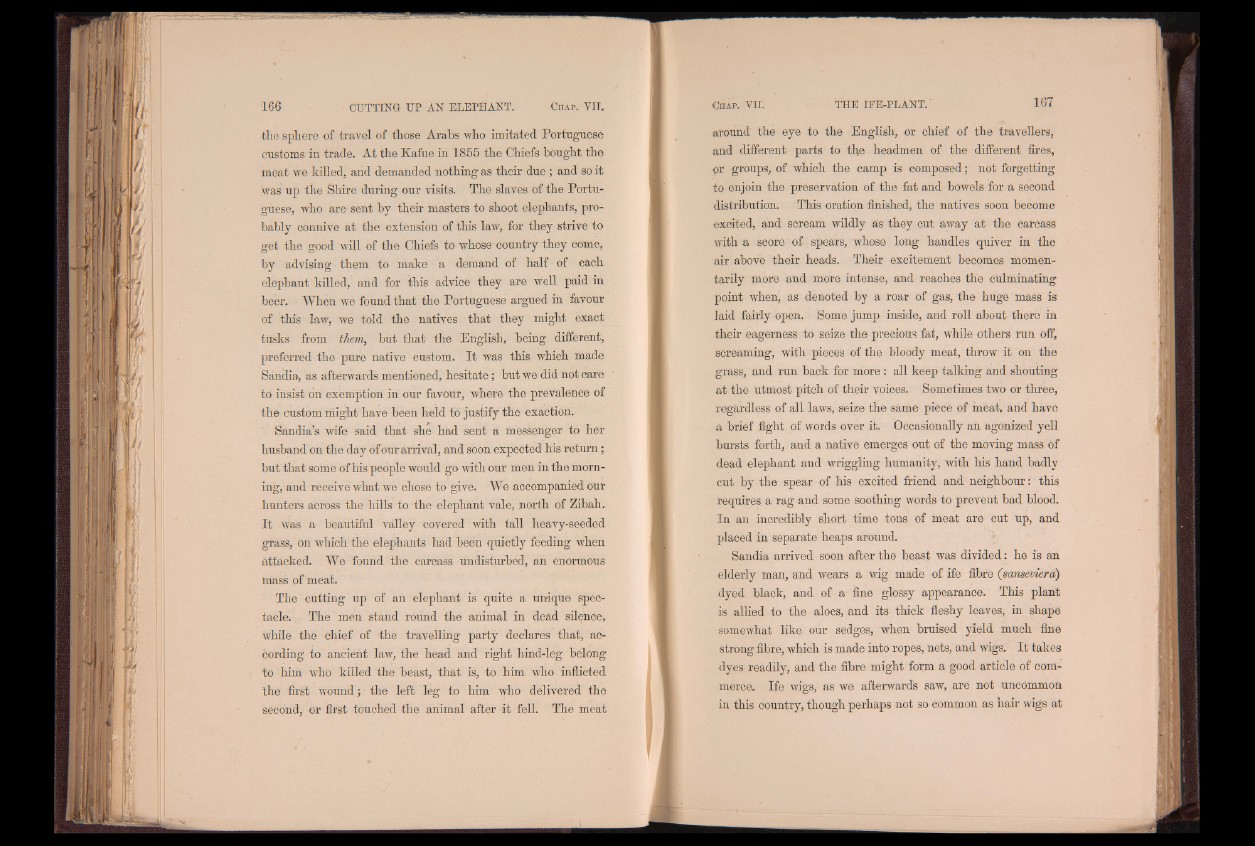
tlie sphere of travel of those Arabs who imitated Portuguese
customs in trade. At the Kafue in 1855 the Chiefs bought the
meat we hilled, and demanded nothing as their due ; and so it
was up the Shire during our visits. The slaves of the Portuguese,
who are sent by their masters to shoot elephants, probably
connive at the extension of this law, for they strive to
get thé good will of the Chiefs to whose country they come,
by advising them to make a demand of half of each
elephant killed, and for this advice they are well paid in
beer. When we found that the Portuguese argued in favour
of this law, we told the natives that they might exact
tusks from them, but that the English, being different,
preferred the pure native custom. I t was this which made
Sandia, as afterwards mentioned, hesitate ; but we did not care
to insist on exemption in our favour, where the prevalence of
the custom might have been held to justify the exaction.
Sandia’s wife said that she had sent a messenger to her
husband on the day of our arrival, and soon expected his return ;
but that some of his people would go with our men in the morning,
and receive what we chose to give. We accompanied our
hunters across the hills to the elephant vale, north of Zibah.
It was a beautiful valley covered with tall heavy-seeded
grass, on which the elephants had been quietly feeding when
attacked. We found the carcass undisturbed, an enormous
mass of meat.
The cutting up of an elephant is quite a unique spectacle.
The men stand round the animal in dead silence,
while the chief of the travelling party declares that, according
to ancient law, the head and . right hind-leg belong
to him who killed the béast, that is, to him who inflicted
the first wound; the left leg to him who delivered the
second, or first touched the animal after it fell. The meat
around the eye to the English, or chief of the travellers,
and different parts to the headmen of the different fires,
pr groups, of which the camp is composed; not forgetting
to enjoin the preservation of the fat and bowels for a second
distribution. This oration finished, the natives soon become
excited, and scream wildly as they cut away at the carcass
with a score of spears, whose long handles quiver in the
air above their heads. Their excitement becomes momentarily
more and more intense, and reaches the culminating
point when, as denoted by a roar of gas, the huge mass is
laid fairly open. Some jump inside, and roll about there in
theh eagerness to seize the precious fat, w’hile others run off,
screaming, with pieces of the bloody meat, throw it on the
grass, and run back for more: all keep talking and shouting
at the utmost pitch of their voices. Sometimes two or three,
regardless of all laws, seize the same piece of meat, and have
a brief fight of words over it. Occasionally an agonized yell
bursts forth, and a native emerges out of the moving mass of
dead elephant and wriggling humanity, with his hand badly
cut by the spear of his excited friend and neighbour: this
requires a rag and some soothing w'ords to prevent bad blood.
In an incredibly short time tons of meat are cut up, and
placed in separate heaps around.
Sandia arrived soon after the beast was divided: he is an
elderly man, and wears a wig made of ife fibre (sanseviera)
dyed black, and of a fine glossy appearance. This plant
is allied to the aloes, and its thick fleshy leaves, in shape
somewhat like our sedges, when bruised yield much fine
strong fibre, which is made into ropes, nets, and wigs. I t takes
dyes readily, and the fibre might form a good article of commerce,
Ife wigs, as we afterwards saw, are not uncommon
in this country, though perhaps not so common as hair wigs at